

AI and Sustainability Expert | Official Rubricist at I, WE - AI & Sustainability
CEO at SI-NET
CEO at MYDIGIT
President of ACCADEMIA DEI COMMERCIALISTI
Personal Leadership & Organizational Culture Masterclass at WOBI, Master in Digital Transformation, has 33 years of activity as System Integrator dedicated to Professional Firms and Companies, and has followed about 500 projects of every dimension and known and met thousands of professionals.
He started as a programmer and was always intrigued by the passage and transformation of technologies, up to the point of studying and implementing Digital Transformation projects for Professional Firms.
Its greatest satisfaction is the fact that it has gone from selling device, office model products to selling MSP as a service solutions.
Today he dedicates himself almost completely to the Digital Transformation in the Firms, working both with the owners and above all with the collaborators: always arguing that the transformation must start from bringing the "resource" to the center of innovation.
Available For: Advising, Consulting, Influencing, Speaking
Travels From: Milan, Italy
Speaking Topics: Digital Transformation, Leadership, Data Driven Strategy
| Fausto Turco | Points |
|---|---|
| Academic | 0 |
| Author | 115 |
| Influencer | 98 |
| Speaker | 0 |
| Entrepreneur | 33 |
| Total | 246 |
Points based upon Thinkers360 patent-pending algorithm.
 La minaccia più grande per gli studi non ha il volto di un algoritmo
La minaccia più grande per gli studi non ha il volto di un algoritmo
Tags: AI, Analytics, AR/VR
 Si può progettare l’empatia? Tre esercizi per scoprirlo
Si può progettare l’empatia? Tre esercizi per scoprirlo
Tags: Culture, Digital Transformation, Leadership
 Viaggio nel cuore dell'innovazione: 7 riflessioni che cambiano la prospettiva
Viaggio nel cuore dell'innovazione: 7 riflessioni che cambiano la prospettiva
Tags: Culture, Digital Transformation, Leadership
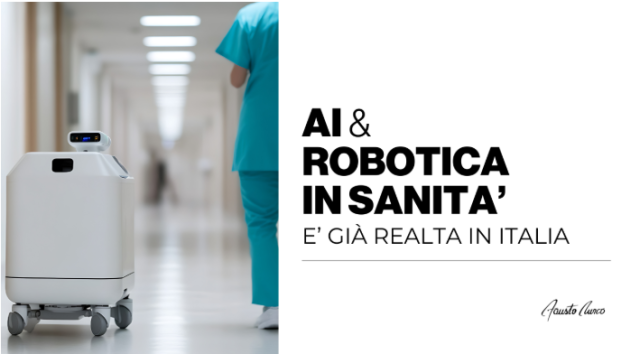 5 eccellenze italiane già operative
5 eccellenze italiane già operative
Tags: Culture, Digital Transformation, Leadership
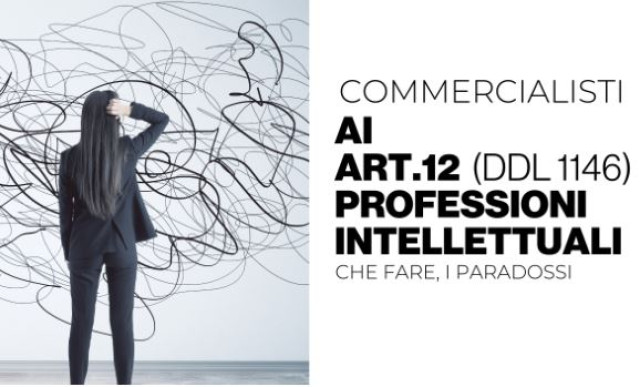 Trasparenza sull'IA: quando spiegare l'inspiegabile diventa obbligo di legge!
Trasparenza sull'IA: quando spiegare l'inspiegabile diventa obbligo di legge!
Tags: Culture, Digital Transformation, Leadership
 Come i dati, al pari delle relazioni, meritano protezione e attenzione
Come i dati, al pari delle relazioni, meritano protezione e attenzione
Tags: Culture, Digital Transformation, Leadership
 La Digital Economy DEVE essere una leva di crescita per i paesi emergenti, come?
La Digital Economy DEVE essere una leva di crescita per i paesi emergenti, come?
Tags: Culture, Digital Transformation, Leadership
 Come i dati stanno riscrivendo le regole della sostenibilità
Come i dati stanno riscrivendo le regole della sostenibilità
Tags: Culture, Digital Transformation, Leadership
 Come stiamo ridefinendo noi stessi attraverso l'intelligenza artificiale
Come stiamo ridefinendo noi stessi attraverso l'intelligenza artificiale
Tags: Culture, Digital Transformation, Leadership
 L'Italia guida il futuro dell'AI, dai suoi fondali marini
L'Italia guida il futuro dell'AI, dai suoi fondali marini
Tags: Culture, Digital Transformation, Leadership
 Chi controlla i nostri dati controlla il nostro futuro
Chi controlla i nostri dati controlla il nostro futuro
Tags: Culture, Digital Transformation, Leadership
 Il futuro dell'apprendimento è già qui
Il futuro dell'apprendimento è già qui
Tags: Culture, Digital Transformation, Leadership
 Dati e AI al servizio della nostra salute e benessere
Dati e AI al servizio della nostra salute e benessere
Tags: Culture, Digital Transformation, Leadership
 La svolta ESG dei Giovani Commercialisti
La svolta ESG dei Giovani Commercialisti
Tags: Culture, Digital Transformation, Leadership
 Rendere l'Intelligenza Artificiale uno strumento di inclusione
Rendere l'Intelligenza Artificiale uno strumento di inclusione
Tags: Culture, Diversity and Inclusion, Leadership
 Un commercialista è molto di più di un algoritmo
Un commercialista è molto di più di un algoritmo
Tags: Culture, Digital Transformation, Leadership
 Se non Conosci l'Employer Branding, non troverai nuovi talenti"
Se non Conosci l'Employer Branding, non troverai nuovi talenti"
Tags: Culture, Digital Transformation, Leadership
 INTEL un gigante tecnologico in crisi profonda
INTEL un gigante tecnologico in crisi profonda
Tags: Culture, Digital Transformation, Leadership
 L'ascesa dell'Intelligenza Artificiale Generativa, sfide e prospettive
L'ascesa dell'Intelligenza Artificiale Generativa, sfide e prospettive
Tags: Culture, Digital Transformation, Leadership
 iPhone 16, Apple AI e AI ACT Europe: la sfida tra innovazione e regolamentazione
iPhone 16, Apple AI e AI ACT Europe: la sfida tra innovazione e regolamentazione
Tags: Culture, Digital Transformation, Leadership
 Qual'è la chiave per attrarre le nuove generazioni negli studi?
Qual'è la chiave per attrarre le nuove generazioni negli studi?
Tags: Culture, Digital Transformation, Leadership
 Sveliamo il potenziale nascosto dei dati: come gli Autoencoder Variazionali stanno rivoluzionando la nostra vita quotidiana.
Sveliamo il potenziale nascosto dei dati: come gli Autoencoder Variazionali stanno rivoluzionando la nostra vita quotidiana.
Tags: Culture, Digital Transformation, Leadership
 L'AI è inutile se non conosci i nuovi protagonisti del TUO business.
L'AI è inutile se non conosci i nuovi protagonisti del TUO business.
Tags: Culture, Digital Transformation, Leadership
 UBER dimostra che quando AI, BIG DATA & ESG si incontrano è vera innovazione e trasformazione
UBER dimostra che quando AI, BIG DATA & ESG si incontrano è vera innovazione e trasformazione
Tags: Culture, Digital Transformation, Leadership
 La metamorfosi e la riorganizzazione della Professione e delle Istituzioni
La metamorfosi e la riorganizzazione della Professione e delle Istituzioni
Tags: Culture, Digital Transformation, Leadership
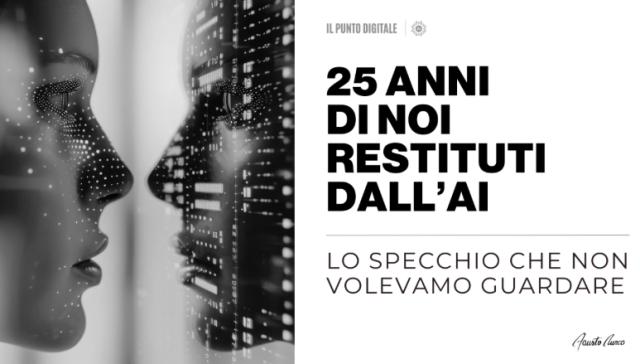 Lo hanno scritto. Lo abbiamo firmato senza leggere. Ora il conto è arrivato.
Lo hanno scritto. Lo abbiamo firmato senza leggere. Ora il conto è arrivato.
Tags: Culture, Digital Transformation, Leadership
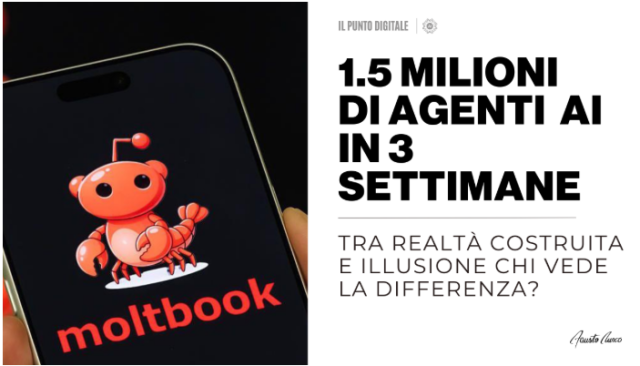 Lo spettacolo degli agenti è iniziato, chi lo governa?
Lo spettacolo degli agenti è iniziato, chi lo governa?
Tags: AI, Analytics, AR/VR
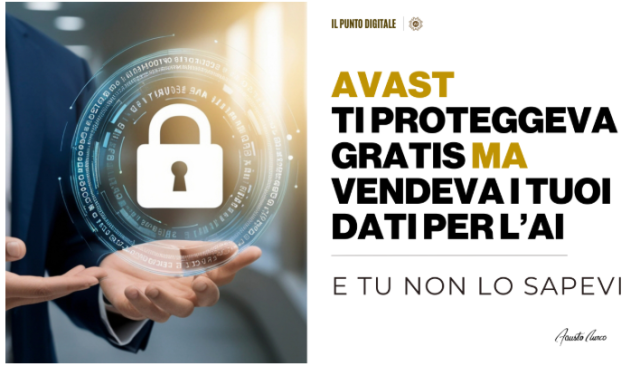 Avast: la protezione era gratis perché il dataset per l'AI eri tu
Avast: la protezione era gratis perché il dataset per l'AI eri tu
Tags: AI, Analytics, AR/VR
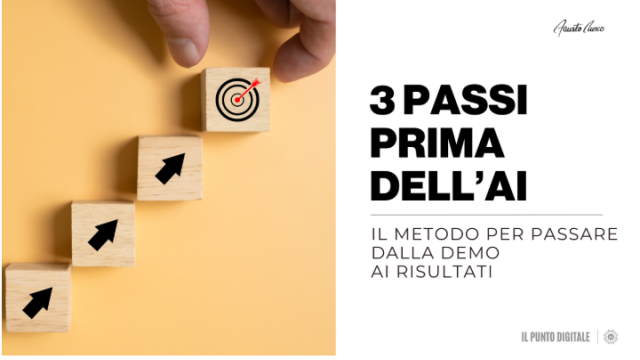 L'AI VIENE DOPO: ecco da cosa partire davvero
L'AI VIENE DOPO: ecco da cosa partire davvero
Tags: AI, Analytics, AR/VR
 Il futuro della sanità è già iniziato
Il futuro della sanità è già iniziato
Tags: Culture, Digital Transformation, Leadership
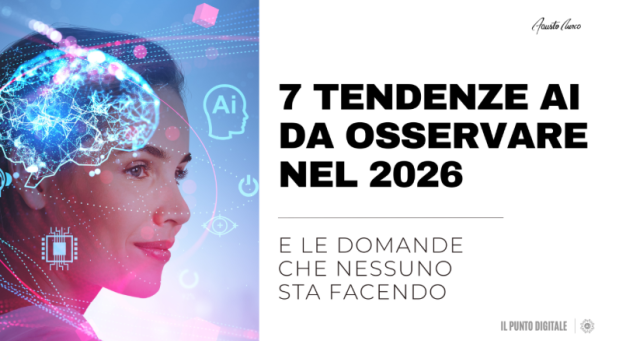 Sette promesse, garanzie?, cosa ci aspetta dall'AI nel 2026
Sette promesse, garanzie?, cosa ci aspetta dall'AI nel 2026
Tags: Culture, Digital Transformation, Leadership
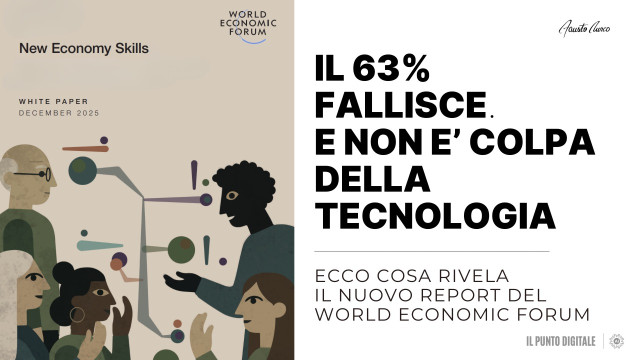 Ecco cosa manca davvero alle aziende
Ecco cosa manca davvero alle aziende
Tags: Culture, Digital Transformation, Leadership
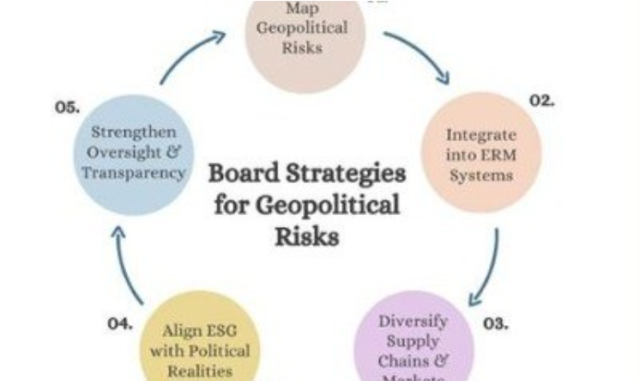 Cosa distingue quel 30% che ha successo dal 70% che fallisce
Cosa distingue quel 30% che ha successo dal 70% che fallisce
Tags: Culture, Digital Transformation, Leadership
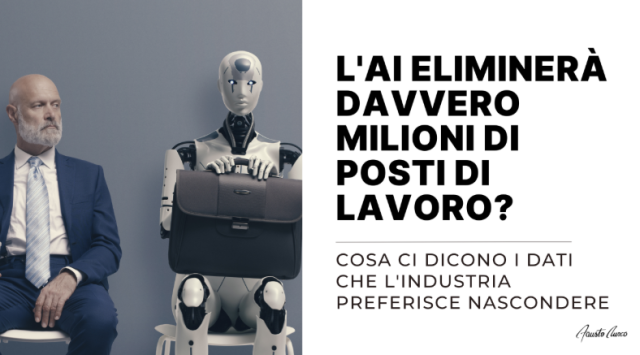 491 licenziamenti al giorno. Ma il World Economic Forum parla di 78 milioni di nuovi posti. Cosa ci sfugge?
491 licenziamenti al giorno. Ma il World Economic Forum parla di 78 milioni di nuovi posti. Cosa ci sfugge?
Tags: Culture, Digital Transformation, Leadership
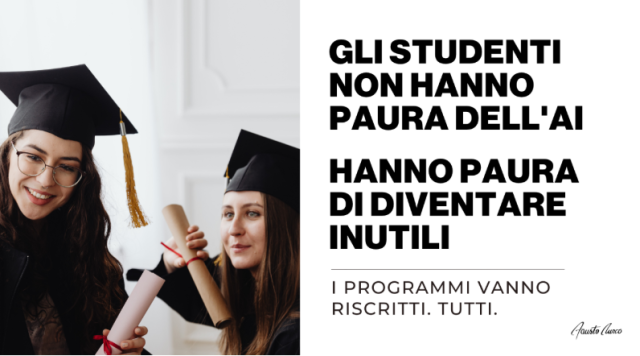 Quello che nessuno dice a chi entra nel mondo del lavoro.
Quello che nessuno dice a chi entra nel mondo del lavoro.
Tags: Culture, Digital Transformation, Leadership
 Chi controllerà l'Infrastruttura dell'Intelligenza Artificiale?
Chi controllerà l'Infrastruttura dell'Intelligenza Artificiale?
Tags: Culture, Digital Transformation, Leadership
 Siamo pronti a lavorare con intelligenze autonome?
Siamo pronti a lavorare con intelligenze autonome?
Tags: Culture, Digital Transformation, Leadership
 Quando l'algoritmo supera il codice: 500 milioni di persone meditano con l'AI e noi facciamo finta di niente
Quando l'algoritmo supera il codice: 500 milioni di persone meditano con l'AI e noi facciamo finta di niente
Tags: Culture, Leadership
 Come applicare il framework di Ethan Mollick per trasformare il modo di lavorare con l'IA
Come applicare il framework di Ethan Mollick per trasformare il modo di lavorare con l'IA
Tags: Culture, Digital Transformation, Leadership
 L'intelligenza artificiale sta già cancellando il futuro professionale di un'intera generazione?
L'intelligenza artificiale sta già cancellando il futuro professionale di un'intera generazione?
Tags: Culture, Digital Transformation, Leadership
 Il futuro del lavoro secondo Ethan Mollick
Il futuro del lavoro secondo Ethan Mollick
Tags: Culture, Digital Transformation, Leadership
 Dal Nasdaq 2000 a Nvidia 2025: come NON riconoscere una rivoluzione travestita da crollo
Dal Nasdaq 2000 a Nvidia 2025: come NON riconoscere una rivoluzione travestita da crollo
Tags: Culture, Digital Transformation, Leadership
 Quando l'AI diventa l'unico abbraccio in una società di soli
Quando l'AI diventa l'unico abbraccio in una società di soli
Tags: Culture, Digital Transformation, Leadership
 Come mantenersi umani cavalcando l'onda dell'AI
Come mantenersi umani cavalcando l'onda dell'AI
Tags: Culture, Digital Transformation, Leadership
 7 indicatori per smascherare i falsi esperti e scegliere la vera competenza
7 indicatori per smascherare i falsi esperti e scegliere la vera competenza
Tags: Culture, Digital Transformation, Leadership
 Come i nostri dati personali plasmano l'Intelligenza Artificiale
Come i nostri dati personali plasmano l'Intelligenza Artificiale
Tags: Culture, Digital Transformation, Leadership
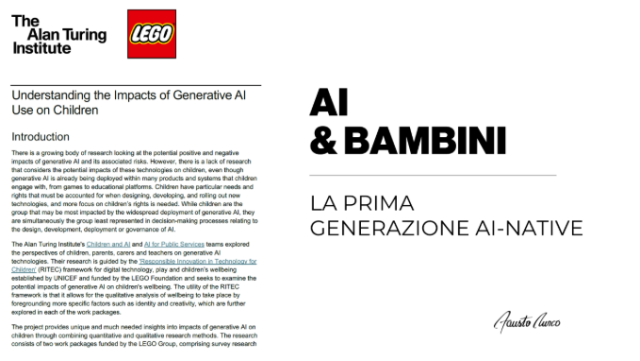 Quando i bambini crescono con l'intelligenza artificiale
Quando i bambini crescono con l'intelligenza artificiale
Tags: Culture, Digital Transformation, Leadership
 Viaggio nel cuore dell'innovazione: 7 riflessioni che cambiano la prospettiva
Viaggio nel cuore dell'innovazione: 7 riflessioni che cambiano la prospettiva
Tags: Culture, Digital Transformation, Leadership
 L'AI che insegna
L'AI che insegna
Tags: Culture, Digital Transformation, Leadership
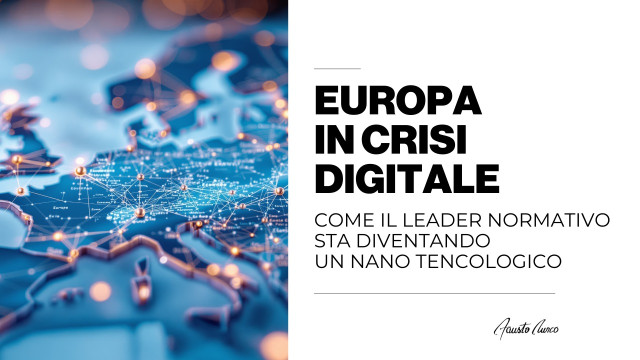 In Europa 270 autorità di regolazione stanno affossando l'innovazione
In Europa 270 autorità di regolazione stanno affossando l'innovazione
Tags: Culture, Digital Transformation, Leadership
 Accademia dei Commercialisti
Accademia dei Commercialisti
Tags: Digital Transformation, Culture, Change Management
 Si-Net
Si-Net
Tags: Culture, Digital Transformation, Leadership
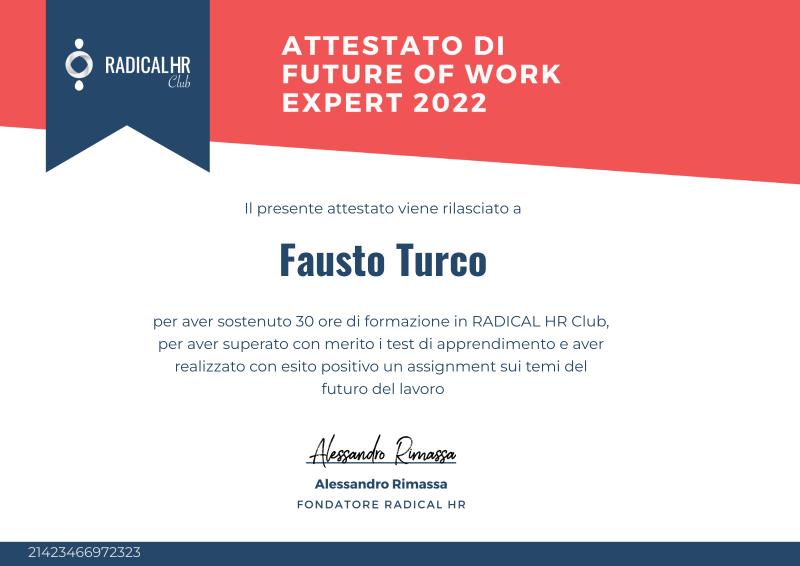 ATTESTATO DI FUTURE OF WORK EXPERT 2022
ATTESTATO DI FUTURE OF WORK EXPERT 2022
Tags: HR, Future of Work
 ENTE NAZIONALE per l'INTELLIGENZA ARTIFICIALE - E.N.I.A.
ENTE NAZIONALE per l'INTELLIGENZA ARTIFICIALE - E.N.I.A.
Tags: AI, Digital Transformation, Leadership
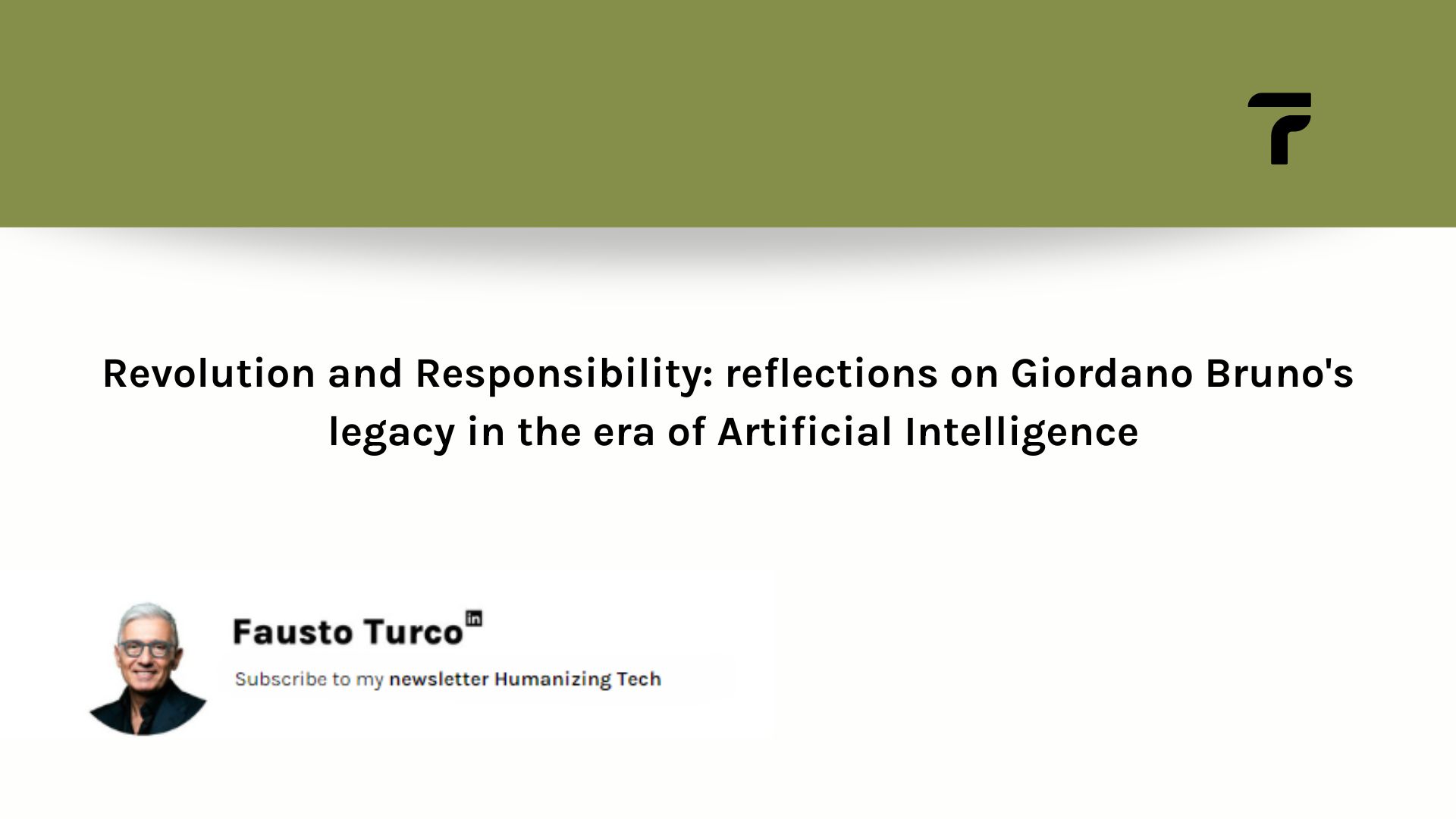 Revolution and Responsibility: Reflections on Giordano Bruno's Legacy in the Era of Artificial Intelligence
Revolution and Responsibility: Reflections on Giordano Bruno's Legacy in the Era of Artificial Intelligence
Five centuries ago, a visionary like Giordano Bruno stood out for his ability to look beyond the present, foreseeing a future where science, if not grounded on solid humanistic foundations, could turn into a force against us. Today, as we delve deeper into the era of artificial intelligence (AI), his words resonate with renewed relevance, urging us to carefully consider the course we are charting.
Artificial intelligence brings with it unprecedented revolutionary potential. However, as Bruno emphasized regarding the science of his time, AI also presents fundamental ethical and moral challenges. The question we ask ourselves is whether we are steering this powerful force towards sustainable human enrichment or towards the dangerous precipice Bruno feared.
History teaches us that progress brings both promises and perils. It is essential to look to the past for insights on how to address new challenges. In this case, we must draw inspiration from Bruno's humanistic approach to science, reminding ourselves that our task is not only to pursue innovation for its own sake but to do so in respect of fundamental human values.
Giordano Bruno's idea that AI should be a tool for human understanding and enrichment, rather than an end in itself, continues to guide our reflections. AI, though endowed with extraordinary powers, must not stray from its humanistic essence. We must constantly question how to ensure that AI serves to promote the well-being and advancement of humanity as a whole.
Our goal, therefore, is not only to harness AI for its technological potential but also to do so responsibly and ethically. We must ask not only what we can do with AI but also what we should do to ensure that its impact on society is positive and constructive.
In conclusion, Giordano Bruno's legacy calls us to deep reflection on the intersection of technology and humanity. AI represents one of the most significant challenges of our time, but also one of the most extraordinary opportunities to shape our future. It is up to us to embrace this challenge with awareness of the risks and responsibilities it entails, working together to ensure that AI truly serves humanity.
Tags: AI, Design Thinking, Entrepreneurship
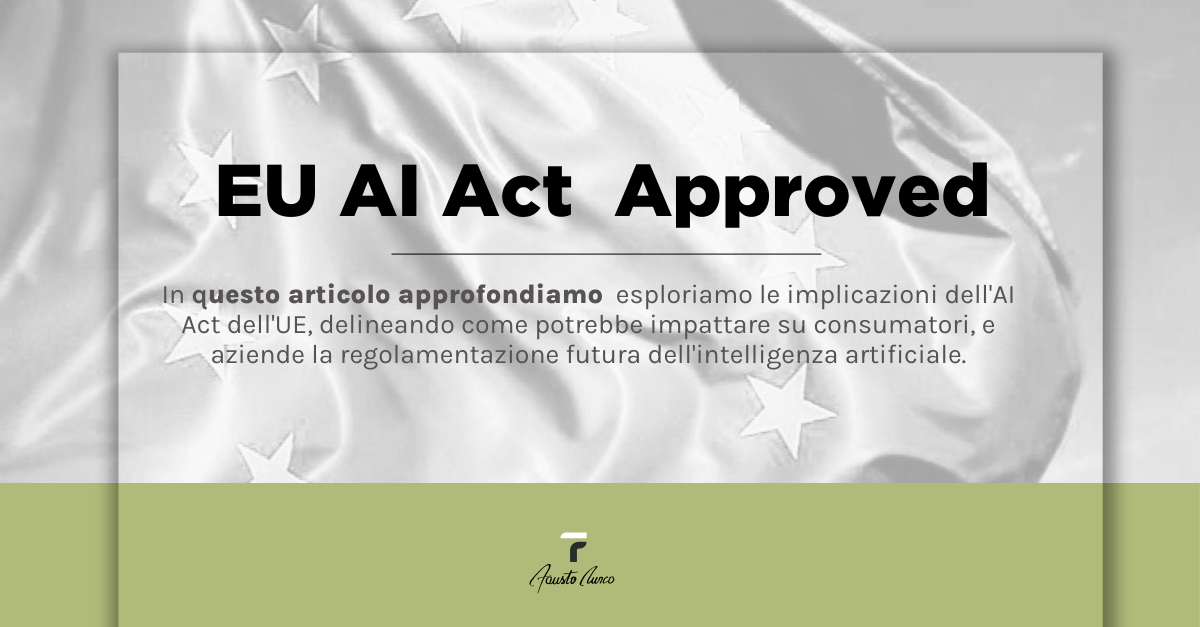 Impact of the new European regulation on AI
Impact of the new European regulation on AI
Approval and Voting: The European Parliament has officially ratified the AI Act, marking a historic turning point in global regulation of artificial intelligence. With an overwhelming majority of 523 votes in favor, 46 against, and 49 abstentions, this legislative act positions the EU as a global precursor in establishing ethical and safety standards in AI usage.
The approval of the AI Act signifies a groundbreaking shift in the regulation of artificial intelligence, positioning the European Union at the forefront of global governance of this revolutionary technology. With the goal of balancing innovation and protection of fundamental rights, this legislation lays the groundwork for ethical, safe, and human-centered AI development. Through exploring its implications for consumers, businesses, and the future of AI regulation, we gain a comprehensive overview of how the AI Act could shape the global technological landscape.
A Regulatory Revolution: The Approval of the AI Act in the EU
Objectives and Ambitions
The AI Act aims to create an environment where AI can be developed and used reliably while simultaneously protecting citizens and their fundamental rights. It introduces a risk-based regulatory approach, categorizing AI applications based on their risk level and applying proportional requirements.
Risk Classification and Prohibitions
This innovative legislation categorizes AI applications from unacceptable risk to low risk, categorically prohibiting those assessed as dangerous, such as social scoring and behavioral manipulation. For high-risk applications, it imposes rigorous transparency and security standards.
Global Impact and European Leadership
With the adoption of the AI Act, the EU seeks to set an international standard for AI regulation, promoting an approach to technological development that is ethical, safe, and individual-centered.
Sanctions for Non-Compliance
Companies that fail to comply with the provisions of the AI Act face significant sanctions, up to 7% of their global turnover, highlighting the importance the EU places on compliance and accountability in the AI sector.
Flexibility and Adaptability
Despite imposing stringent rules, the AI Act leaves room for innovation, allowing the industry to adapt and innovate within the bounds of the law, especially regarding low-risk applications and support for startups and SMEs.
Next Steps and Implementation
Following parliamentary approval, the AI Act will proceed towards entry into force after its publication in the Official Journal of the European Union, ushering in a transition period for businesses and authorities to adapt. The establishment of an AI governance body will be crucial for the effective implementation and monitoring of the law.
The AI Act: Between Innovation and Regulation
The new law raises a series of considerations, from opportunities to risks and challenges, deserving thorough analysis.
Safeguarding Fundamental Rights
One of the AI Act's main strengths is its commitment to protecting citizens' fundamental rights. The inclusion of specific provisions against discriminatory use of AI and behavioral manipulation underscores the EU's clear stance against practices that may undermine democracy and ethical values. However, this requires ongoing updates of definitions and risk criteria to keep pace with technological evolution.
Promoting Innovation and SMEs
The AI Act promotes innovation by creating "regulatory sandboxes," offering SMEs and startups the opportunity to develop and test new technologies within a regulated framework. This is crucial for keeping the EU competitive on the global AI stage, but it requires a delicate balance to avoid stifling innovation with excessive bureaucracy.
Debate on Biometric Surveillance
The decision to allow the use of biometric surveillance by law enforcement agencies under exceptional circumstances has raised concerns. While there are safeguards, there is a risk that these technologies may be misused, leading to invasive surveillance and privacy violations. It is crucial for the EU to closely monitor the implementation of these technologies to prevent abuses.
Generative AI and Intellectual Property
The late inclusion of generative AI models in the AI Act raises questions about the regulation's ability to keep pace with technological innovations. Copyright compliance and transparency are vital aspects, but regulations must be flexible enough to adapt to future developments without hindering progress.
The Challenge of Global Interoperability
As the EU seeks to position itself as a leader in AI regulation, the challenge of interoperability with other jurisdictions, particularly the United States and China, emerges. It is essential for the EU to promote international dialogue to create global standards and ensure that the AI Act does not become a barrier to international trade and collaboration.
Sanctions and Enforcement
The severe sanctions envisaged by the AI Act for non-compliance highlight the importance the EU attaches to AI regulation. However, to ensure effective enforcement, robust monitoring mechanisms and cooperation among Member States will be essential, along with ensuring that SMEs are not deterred by potential sanctions.
A Path Yet to Be Traveled
The AI Act is a significant but not definitive first step in the regulation of AI. It will be crucial for the EU to remain vigilant, ready to amend and update legislation in response to rapid technological changes and their social, economic, and ethical implications. While the AI Act represents a significant advancement in AI governance, its success will depend on the EU's ability to adapt and respond to emerging challenges in this dynamic technological field.
Advantages
The AI Act represents a milestone in AI regulation, aiming to strike a balance between technological innovation and the protection of fundamental rights. Among its main advantages is the promotion of ethical, responsible, and transparent AI usage, positioning the EU as a leader in implementing high standards for privacy protection and security. Additionally, the legislative act provides regulatory clarity to businesses, facilitating responsible innovation and competitiveness in the global AI market.
Disadvantages
Despite positive intentions, the AI Act presents some disadvantages, including the risk of imposing excessive regulatory burdens that could hinder startups and SMEs, thus limiting innovation and growth in the AI sector. The law may also prove too rigid to quickly adapt to technological advances, limiting the EU's ability to effectively address future challenges posed by AI. Furthermore, the possibility of biometric surveillance in exceptional circumstances raises concerns about privacy and individual freedom.
Challenges
The main challenges posed by the AI Act include ensuring effective and uniform enforcement across all EU Member States, given the complexity and variety of AI technologies. A significant challenge is also to keep legislation up to date with rapid technological development, avoiding obsolescence. At the same time, the EU must balance the promotion of innovation with the need to protect citizens, ensuring that regulations do not unduly limit the potential for AI development.
Opportunities
The AI Act opens up several opportunities, including positioning the EU as a leading region in setting global standards for ethical and safe AI, exporting its values and principles internationally. It also offers the opportunity to stimulate innovation through regulatory experimentation spaces, supporting research and development of innovative AI solutions that respect fundamental rights. This can also encourage businesses to invest in responsible and secure AI technologies, promoting sustainable growth.
EU's Role Internationally
The adoption of the AI Act strengthens the EU's role as a pioneer in AI regulation, confirming its position as a leader in global technology governance. The EU has the opportunity to influence international standards and promote an ethical and responsible approach to AI, serving as a model for other regions. Furthermore, through international dialogue and cooperation, the EU can contribute to establishing a global framework for AI regulation that respects human rights and promotes sustainable technological development.
Tags: AI
 NexGen Forum Ricchezza: Esplorando il Futuro degli Investimenti
NexGen Forum Ricchezza: Esplorando il Futuro degli Investimenti
Location: Talent Garden 6 Via Arcivescovo Calabiana 20139 Milano Italy Date : October 17, 2023 - October 17, 2023 Organizer: Nexgen Forum
 L'importanza del benessere in Azienda
L'importanza del benessere in Azienda
Location: Virtual Date : March 10, 2023 - March 10, 2023 Organizer: Fausto Turco
 Lo hanno scritto. Lo abbiamo firmato senza leggere. Ora il conto è arrivato.
Lo hanno scritto. Lo abbiamo firmato senza leggere. Ora il conto è arrivato. Lo spettacolo degli agenti è iniziato, chi lo governa?
Lo spettacolo degli agenti è iniziato, chi lo governa? Avast: la protezione era gratis perché il dataset per l'AI eri tu
Avast: la protezione era gratis perché il dataset per l'AI eri tu